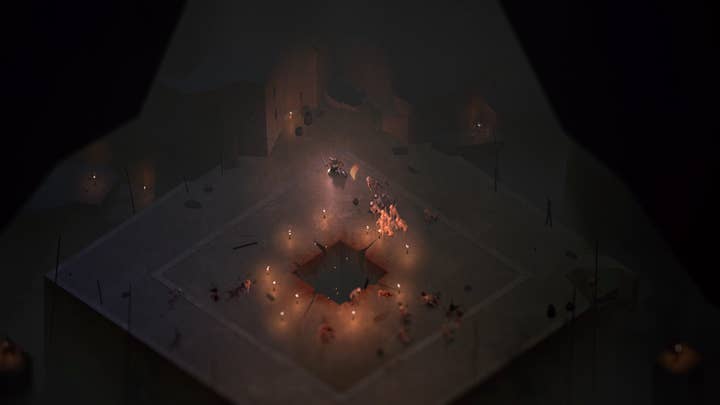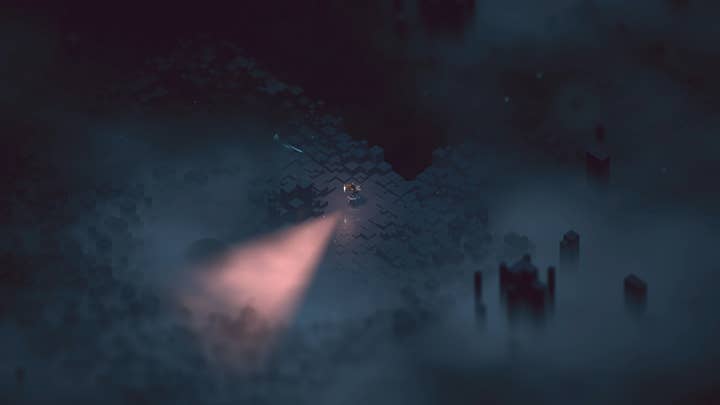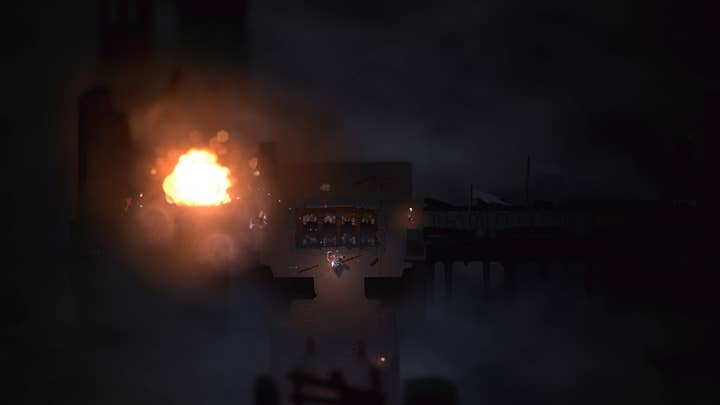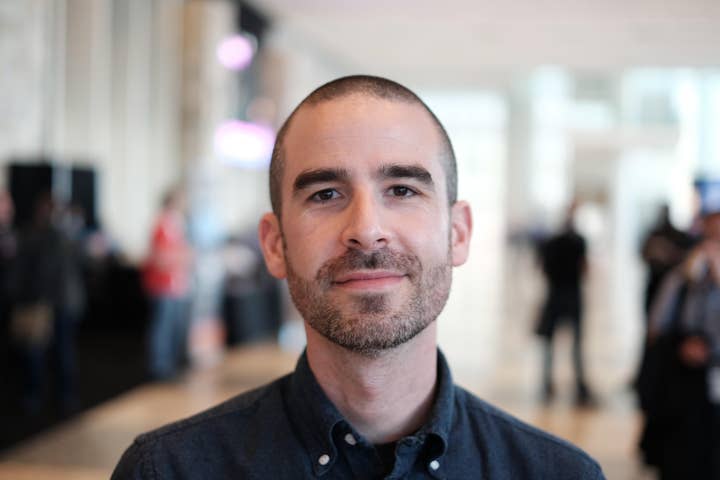"Apathy is how games die"
Nathan Vella tells us how Capy has done everything it can to ensure Below is worth the five-year wait
Anticipation is a vital ingredient in a video game's success. But while this can be maintained for years in some cases, when it's more than half a decade since you announced your game, it's more than likely that some of your initial fans will have lost interest -- especially if you're an indie.
This is the challenge Canadian studio Capy faces when it finally releases Xbox One roguelike Below tomorrow.
Announced as far back as Xbox's E3 2013 press conference, the game has been on people's radars since before the console was even on shelves. Already attention is shifting towards the next generation, and the genre Below once hoped to define has been expanded by other studios. Once a hotly anticipated title, it's in danger of being forgotten or missed by many.

Yet, as we've already heard, Capy's co-founder and president Nathan Vella is not afraid or whether or not Below will sell. Indeed, he remains hopeful that those won over by the 2013 unveiling will believe Below was worth the wait -- in part due to the air of mystery the game has maintained over the last five years (plus the year it was in initial development).
"People really don't know much about the game, even though we've been showing it for years," he says. "There is a massive amount of this game that no one has ever seen. Some of the huge pieces of this game, the stuff that took us super long, that one programmer toiled on for years and years -- people don't even know it exists, and they won't until it comes out by people playing it and posting about it.
""There's a lot in there that we will never talk about and is only in there for players to find. Some of that stuff they'll find the first day, and that's cool. We hope that's the case. But we want to keep some stuff not spoiled."
Perhaps the largest concern is that Below missed its optimum launch window. When it was announced, roguelike games were fewer and further between but countless titles have won over potential Below customers in the past few years -- in fact, as Vella observes, the number of new releases over the past five years has increased dramatically as platforms, particularly consoles, have become more open to indie studios.
"There is a massive amount of this game that no one has ever seen... and they won't until it comes out by people playing it and posting about it"
But he argues there are benefits to having more roguelikes already on the market -- "Now we don't have to teach people certain things, we don't have to explain why this is cool, because there's an entire niche of the video games industry devoted to this style of game" -- and despite the steady flow of rival titles over the years, the Capy boss says there hasn't been a significant change in how avidly gamers have been demanding a release date for Below.
"For whatever reason, people are still really excited for us -- or really angry at us," he says. "We haven't experienced a ton of apathy. Apathy is how games die. Projects fail not because people think they are bad, but because people don't know or care that they exist.
"Some people that could have been hardcore fans have given up on us, and I understand that. I don't begrudge them -- we took a long time. We just hope that when we put it out, that those people will hear something that will remind them why they cared."
This ties back into Capy's strategy of keeping much of Below a secret. The hope is that everyone from YouTubers and Twitch streamers to Steam forums and Twitter users will broadcast their discoveries to the world -- with Vella adding: "There are some streamers who are going to eat this game alive."

"My real desire is that it finds people who really, really want to go deep on it and they find the things we want them to find. Those are the ones that are going to become the beacons in the darkness for people to find Below. People will be like 'holy shit, they just found this really cool thing -- I want to try to find another cool thing'.
He continues: "There's no recipe for how we accomplish that. We can't just go out and pay Ninja to stream Below, that would be entirely ineffective and would never work -- nor would it ever make sense for him. But there are certain streamers or influencers or players in general that if they get into it, it will be a big win for us."
"Apathy is how games die. Projects fail not because people think they are bad, but because people don't know or care that they exist"
Even without keeping potential customers interested, it must have been difficult to keep the Below team motivated for six years. Refusing to take any credit, Vella says the fact Below got finished at all is a "testament to the team, not to me or the studio."
"They're the people who have put in the time and done the work needed to get this game to ship," he says. "This is their success."
Over the years, of course, some members of the team departed -- whether because they had burned out on this particular project or to explore a better opportunity -- but by and large, Vella tells us "the folks that started on the project, finished it".
"It was hard, and I don't think people were always motivated," he says. "Every game, whether it takes a year-and-a-half or six years, has that lull in the middle where shit's broken, design's not going right, art's ugly and there's no sound. All of the best studios, the best projects, have to get through that point -- ours was just kinda long.
"There's a handful of people on that team that are just superhuman and I will be forever indebted to them."
It helps that Capy is a multi-project studio. During the development of Below, the developer has released a handful of titles, collaborated on DLC for Klei Entertainment's hit Don't Starve and begun work on some unannounced projects. The success of these releases, plus back-catalogue games, "literally buys us some freedom."
"It's a luxury, but it's also a curse," says Vella. "I'm very aware -- and happy -- that we are a studio that can take its time, explore a little bit, that can put this game out now instead of three years ago because we were going to run out of money."
"Streamers who really want to go deep on Below are going to become the beacons in the darkness for people to find the game"
All of this sets up Below for potential success, gives it a chance to reward the risks Capy took on taking its time with the development. But the question remains: why was so much time needed?
When Below was announced in 2013, Vella knew it was still "far-ish out." He knew it wouldn't be out in 2013, but he hoped the Xbox One roguelike might manage early to mid 2015. He certainly didn't expect it would take a further five years. However, soon after the game's unveiling, it became apparent there was a lot more work to do.
"We announced because we were like 'okay cool, combat feels fun, we've kinda got procedural generation working, we understand some of it'," he says. "But we realised a game like this can't function on a singular system. We needed to build out the systems, build out the overall design. What are you doing? Why are you doing it? How deep does it go, both in terms of systems and in literal levels?"
Having never made a roguelike, or even a system-based game before, searching for answers just prompted more questions. There developed an appropriate parallel in that a game about a journey through the depths began to feel as such for the team, digging deeper into the core concepts of Below to find what lay at the heart of it.

Each system -- whether it was survival, crafting or the procedural generation -- would work in isolation, but bringing them together would create more challenges or deliver an experience different to the one the team were aiming for. Solving one issue would break something else, and throughout Capy would question what they wanted the game to be about.
"We'd ask, did we really want Below to be what we announced, or could it be something different? Should it be something different?" Vella recalls.
A prime example comes from one of Below's key items: a lantern players find shortly after they arrive on the game's mysterious island. Mechanically, this makes your surroundings more visible, but Vella says this became much more thematic, about the nature of light and what lurks in the darkness. But when Below was first announced, there was no lantern, no interplay between light and dark, and this actually prompted the shift to 3D.
"Every game has that lull in the middle where shit's broken, design's not going right, art's ugly and there's no sound -- ours was just kinda long"
"When it was 2D, there was no opportunity to use light in that way," Vella explains. Light is a very challenging thing in 2D games, you're not casting shadows and stuff like that. So the second we started going down that route, we were like 'first of all, this is really cool and it fits the aesthetic, the theme, the tone and the atmosphere... but we now need to make the game predominantly 3D in order for it to work'.
"That was a big change. There are still 2D hand-painted things in the game, but it's predominantly 3D, and that switchover was pretty substantial. Did it make the game better? Absolutely. Did it make the game more interesting? Absolutely? Did it take a long time and create a whole bunch of problems? Absolutely. There are definitely big rewards to the risks that we took, but you have to take those if you have a vision."
It's surprising to find out how much of the game has changed. One would assume that when a title is announced, that's an indication that the concept is finalised, the themes are in place, and the systems are already working to an extent.
"Oh yeah, and that's the right way to do it," Vella laughs. "In our case, we thought we had that until we started putting systems together, exploring a little bit and seeing where it could go. It was going to be a very different game."
Vella stresses that, despite the changes to the game, Capy "never hit the full reset, never started from scratch", and assures that the indefinite delay announced two years ago "gave us the time to figure out how long it was going to take, not because it was miles off but because there was a bunch of stuff we wanted to do."
There were also wider changes Capy needed to contend with. Video games is a fast-moving industry, and shifting expectations from consumers prompted yet more work for the Below team.

"We spent a lot of time making the game work in 4K because we know that 4K is a thing, people actually give a shit, so we needed to do that," Vella says. "That's not free -- it takes time, effort and testing.
"Even the move from 2D to 3D brings about a fidelity expectation. Fortunately we have an utterly phenomenal art and tech team, but our original vision for the game versus where we ended up... there's just no doubt in my mind part of it was motivated by how much better other people's games started looking. The bar progressively raises and we have to meet that bar or else our chances of success go down."
With Below finally available tomorrow, Vella is happy to reflect on the lessons learned -- not announcing too early being a prime one. Much of the technical and organisational learnings have already been implemented into the likes of Don't Starve's Shipwrecked expansion or Capy's next projects. But more than that, Vella reports Below's development has had an impact on the people behind it.
"If you're working on a game for six years, your desire as a creator or someone working in tech [is] going to change," he says. "What you started out doing on Below, you might want to try something different. There's some personal learning. A lot's changed in my career, in my personal growth."
He mentions several times that Capy likes to attempt something new -- ideally a new genre -- with every project, but recognises it would be a waste not to explore systems-based games given everything he and the team has learned. While he's not in a hurry to build a similar project, he stresses that this long-awaited launch is not the end for Below.
"It's definitely not something we're going to put out and be like 'oh, thank good, right, job done, see you later'," he laughs. "We're going to do our best to support it, especially if it finds a cool audience. It doesn't have to be this smash hit for us to keep it going, but if there's a sizeable group of people that care about the game and want to go deeper, who knows, maybe we'll try to do some more."

